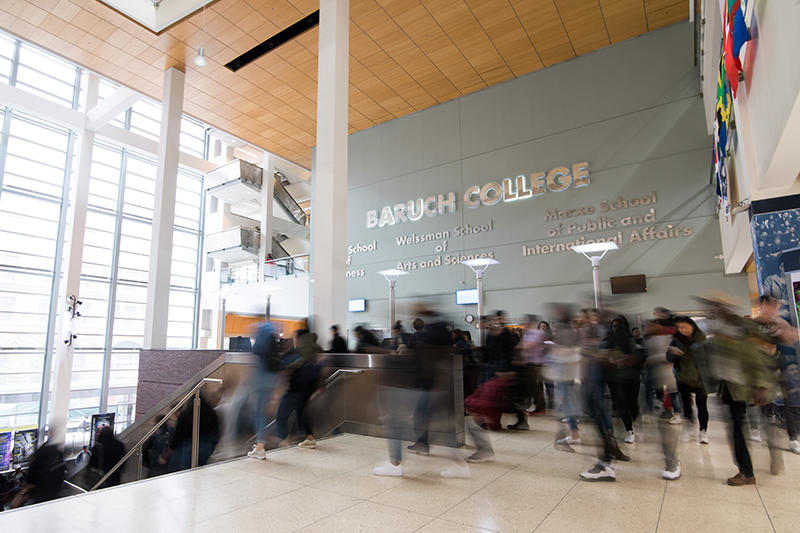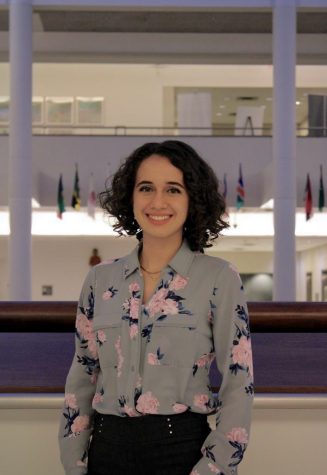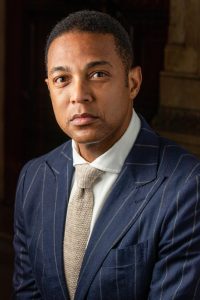Community feedback session focuses on search for next provost
November 19, 2020
The search committee for the next Baruch College provost and vice president for academic affairs held a community feedback session on Nov. 17.
The Provost is responsible for internal academic affairs, such as faculty and curriculum.
Currently, the college has an interim-acting provost, public health expert James McCarthy. He began his two-year term at Baruch after former Provost David Christy retired in 2019.
The session’s purpose was to inform the community about the search process, establish the criteria for candidates and solicit feedback from faculty and students.
There was an emphasis on making the process open and transparent. The Baruch community, as well as potential candidates, are expected to be fully informed of the recruitment process.
The chair of the search committee is Arthur Downing, the vice president for information services and dean of the library.
As the facilitator, he began the session by introducing the executive search firm that Baruch hired, WittKieffer. Two senior consultants from the firm, Robin Mamlet and Melissa Fincher, were present.
Mamlet spoke about how they will not wait for applications, but rather solicit nominations and proactively recruit candidates.
Downing presented three questions to prompt discussion. These questions asked what critical issues and priorities the provost will face, as well as what ideal qualities and qualifications he or she should have.
The questions also inquired as to what type of progress in the next three to five years will indicate that the right person was chosen.
Glenn Petersen, a professor of anthropology, discussed one issue he said he believes the next provost will face.
Baruch President S. David Wu has mentioned beginning incentive-based management. This may include merit-based pay, which is resisted by the faculty union due to its political volatility.
Peterson said he believes that this dilemma is on the horizon for the next provost, who must enter the position understanding the issues that began before induction.
He also wants the next provost to be genuinely interested in listening to the faculty. They should be tactful, respectful and receptive to others’ ideas, he said.
Teresa Hurst, director of the counseling center, spoke about the quality of leadership. She called for a provost who will facilitate open communication, collaboration and partnership.
Mary McGlynn, an English professor, also gave her thoughts on the provost search process. She said that the committee shouldn’t reject candidates for not being ideal, as this may be counterproductive toward finding a good fit.
Student representatives also attended the session to voice their concerns.
Osvaldo Garcia, a climate scholar and Undergraduate Student Government chair of philanthropy, discussed climate change, diversity, equity and inclusion.
He said he believes that the next provost should consider these issues seriously, as they are of great importance to the student body.
Cynthia Thompson, a management professor, echoed Garcia’s comments. She said she hopes that climate change and ways to combat it will be spoken about more in the classroom.
Journalism professor Gisele Regatao continued the conversation about diversity.
She brought up the need for detailed plans to institutionally transform Baruch, as promised by Wu. The focus must be on more than just numbers, but also on how to specifically create an inclusive curriculum.
Another issue discussed was the implementation of online learning.
Regatao said that the administration is hoping to make the virtual format a bigger part of Baruch’s future.
The next provost must desire to understand online learning, how effective it is and what experience students are having. These concerns must be addressed if virtual learning will occur beyond the pandemic.
Peterson brought up that while CUNY is meant to be a public institution, financially supported by the city and state, it is mainly enrollment-driven now.
As a result, an increasing number of students have been enrolled despite Baruch not having the capacity for them. He cited how the Newman Vertical Campus was designed for 14,000 students, yet Baruch’s population is now about 18,000 students.
This presents an incentive for the college to continue using virtual learning after the pandemic is over.
McGlynn joined this conversation, saying that the administration must be careful about enrolling more students and moving boldly toward the online format.
She said she believes that decisions should be made not just based on expediency and economics, but also on the original mission of public education.
Student support services were the next issue that was discussed.
Hurst said she’d like the provost to prioritize counseling and academic advisement, as well as create a partnership between the two.
They are often linked, as mental health issues hold back students from completing their degrees. Similarly, academic challenges exacerbate mental health issues.
Peterson voiced his agreement that support services are important for students.
Student representatives continued the conversation on the challenges students face in conjunction with school policy.
Laiba Hussain, a sophomore and USG’s chair of public opinion, spoke about how the Baruch community comes from different backgrounds and financial situations.
Garcia explained how thousands of students are struggling during this health and economic crisis, making it difficult to balance work and familial duties with schoolwork.
They requested that these challenges be considered by the provost while influencing the decision about the Credit/No Credit policy.
The next topic was Wu’s goal of increasing interdisciplinary studies across the school.
Peterson observed that there is a willingness and interest in this goal among faculty and students. However, its biggest obstacle is the demanding requirements of business majors.
There is often no room in students’ schedules to include classes that are not put toward their degree.
Hussain then brought up the Weissman School of Liberal Arts and Marxe School of Public and International Affairs to emphasize that their majors are just as important as those at the Zicklin School of Business.
She called for a provost who will fund and strengthen the education of every school and department at Baruch.
Jody Vaisman, director of the Macaulay Honors Program at Baruch, talked about the separate governances of the college. She started a discussion about how the provost could help break those barriers.
Allison Lehr Samuels, director of Baruch’s Center for Teaching & Learning, who is also a member of the search committee, spoke of the importance of the provost’s ability to navigate bureaucracy.
The list of finalists will be announced and in the spring of 2021, the next provost will be chosen and inducted most likely in July.
Further community feedback can be given through the survey or emailed to WittKieffer at baruchprovost@wittkieffer.com.
There will also be another community feedback session on Nov. 23 from 1:30-2:30 p.m.








